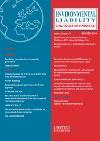Environmental Liability - Law, Policy and Practice - Volume 28 - Issue 3

Volume 28 Issue 3/4
Special Issue
Law and the Environment Conference 2023, University College Cork
Environmental Law as Administrative Governance (Part II)
Editorial
Regulatory innovation in environmental governance
OWEN McINTYRE
University College Cork
Articles
Obligations under the TFEU to use scientific data in EU environmental law
RHODA JENNINGS
School of Law, University College Cork
The role of scientific evidence in policymaking is gaining attention at an EU level. Policy initiatives such as the EU Knowledge4Policy platform are being developed to improve the science-policy interface. Scientific data also has a more substantive role to play in the formulation of policy and legislation. Article 191(3) TFEU sets out that in preparing its policy on the environment, the EU must take account of the ‘available scientific and technical data’. Once interpreted as a procedural requirement, the Article has evolved from a consideration to a binding and imperative obligation in both policy and legislation. This interpretation has implications for the development of environmental policy and legislation, particularly in light of the increased scrutiny being applied by the CJEU to the factual underpinning of legislative measures
Sustainable corporate governance: the French approach
CATHERINE MALECKI
Professor of Private Law, Rennes 2 University, France
This article offers a bird’s-eye view of ESG (environmental, social and governance) reporting over a 20-year period, alongside the French approach to recent EU developments. French leadership on non-financial reporting has been significant. ESG originated with the socially responsible investment paradigm but with the evolution of the non-financial reporting from the Non-Financial Reporting Directive (2014) to the Corporate Sustainability Reporting Directive (2022) ESG reporting has developed tremendously. The French Market Authorityand the former French Corporate Governance Code for French-listed companies have played a major role in changing corporate behaviour and under EU and French leadership things are moving in a better way
Non-state actors’ direct enforcement of international environmental law: the example of ‘environmental pirates’
LAURENCE TEILLET
Nottingham Law School
This article examines the alleged authority of Transnational Environmental Advocacy Groups (TEAGs), particularly Sea Shepherd, in directly enforcing international environmental law on the high seas. The rise of environmental activism has faced severe responses from states, often resulting in piracy charges and convictions. To evade piracy prosecutions and convictions, TEAGs have invoked the concept of the prescription of the law, claiming they are authorised to enforce international environmental law. This article analyses Sea Shepherd’s reliance on the World Charter for Nature and also examines the doctrine of citizens’ arrest and its potential for TEAGs to enforce international environmental law
The environmental rule of law’s contribution to international climate mitigation
JAN ALEXANDER JESKE
Hamburg University and Hanseatisches Oberlandesgericht
The environmental rule of law is one of the key principles in saving planet Earth for future generations. Every regulation for environmental protection can only have an impact to the extent that it is accessible, applied and enforced. Therefore, a closer look at the development, scope and current international challenges of the environmental rule of law is necessary to gain a better understanding of this central pillar of international environmental law: what is the status quo? Which global and domestic achievements and problems stand out? And how could sustainable governance be improved across Europe, America and Asia? This short research paper offers a brief overview of the most recent discussions, developments and reasoning
The status of environmental NGOs under the Aarhus Convention: constituting the public
ALISON HOUGH
Senior Lecturer, Technological University of the Shannon, Athlone
This article discusses the provisions for environmental NGOs under the Aarhus Convention and the complexities of the regime. It then examines how this framework finds expression under EU and Irish law, and the compatibility of both regimes with the Convention’s provisions, focusing in particular on issues of access to justice, capacity, legal character and standing. The pending CJEU reference in Dublin 8 Residents v An Bord Pleanálais also discussed
Blueprint for an Environmental Code: proposals for enhanced environmental governance in Ireland
CLIONA KIMBER, ORLA HEATLEY
This article addresses the deficiencies in the Irish legal system’s mechanisms for environmental governance. It highlights the disparate nature of environmental law in Ireland and the justice system’s lack of capacity to deal with environmental-legal problems. The authors propose possible solutions and present a draft Environmental Code that would reform Irish environmental governance
Are Marine Protected Areas (MPAs) in areas beyond national jurisdiction able to steal the spotlight from traditional high seas freedoms?
ANEMOON SOETE
University of Ghent
The BBNJ Treaty presents MPAs as a key tool in the protection of biodiversity beyond national jurisdiction. This article considers whether the Treaty is capable of remedying the issues underlying the current limited success of MPAs in areas beyond national jurisdiction and whether there is a place for them alongside the traditional high seas freedoms
Current Survey
European Union
MARTIN HEDEMANN-ROBINSON
University of Kent, Canterbury
Key policy developments, law enforcement issues and environmental legislation
update August-December 2021
